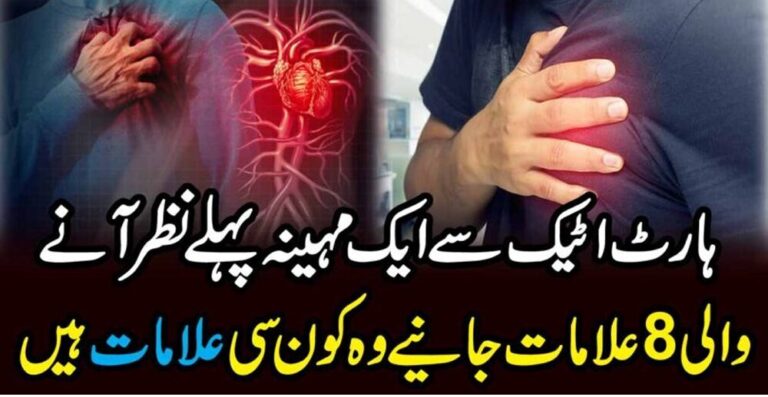Your body has an amazing way of sending warnings when something isn’t right. Most people think a heart attack happens suddenly, out of nowhere. But in reality, your body often drops subtle hints weeks before it strikes. Recognizing these signals could literally save your life.
Heart disease remains one of the leading causes of death worldwide, and ignoring early warning signs is like ignoring a fire alarm—it only gets worse. So, what are the signals your body gives a month before a heart attack? Let’s break them down one by one.
Understanding Heart Attacks
A heart attack occurs when the blood flow to part of the heart muscle is blocked, usually by a blood clot. Without enough oxygen-rich blood, the heart muscle begins to die.
But here’s the thing: your heart doesn’t just shut down overnight. It struggles first, and that struggle creates symptoms. Learning to recognize them early can mean the difference between a close call and a tragedy.
8 Signals Your Body Gives Before a Heart Attack
1. Persistent Chest Discomfort
Chest pain or discomfort is the most common warning sign. It might not always feel sharp—it can feel like pressure, tightness, fullness, or even burning. If it lingers or keeps coming back, don’t dismiss it. This is your heart crying for help.
2. Shortness of Breath
Do you feel breathless even after light activity—or worse, while resting? That’s a red flag. When your heart isn’t pumping efficiently, your lungs don’t get enough oxygen, making you feel out of breath.
3. Unusual Fatigue
We all get tired, but the fatigue related to heart issues is different. Imagine feeling drained even after sleeping well or exhausted from simple tasks like climbing stairs. This happens because your heart is struggling to supply your body with oxygen-rich blood.
4. Dizziness and Lightheadedness
If you suddenly feel dizzy, weak, or like you might faint, your blood circulation could be compromised. When your brain doesn’t get enough blood flow, it reacts quickly—warning you that your heart is in distress.
5. Cold Sweats
Breaking out into a cold sweat without exercise or heat is a classic sign. This happens because your nervous system goes into panic mode when the heart is under strain. It’s like your body ringing alarm bells.
6. Pain in Other Areas
Heart-related pain doesn’t always stay in the chest. It can radiate to the shoulder, back, neck, jaw, or arms (especially the left arm). Many people mistake this for muscle pain, but it’s actually your heart signaling trouble.
7. Indigestion or Nausea
Some people experience heartburn, indigestion, or even vomiting before a heart attack. The reason? The heart and stomach share similar nerve pathways, so distress signals can overlap.
8. Sleep Disturbances
Do you struggle with insomnia, restlessness, or waking up suddenly breathless? These disturbances may be linked to heart stress. If your body is anxious and restless without reason, your heart may be the culprit.
Risk Factors You Shouldn’t Ignore
Certain factors make heart attacks more likely:
- Lifestyle: Smoking, heavy alcohol use, poor diet, and lack of exercise.
- Medical Conditions: High cholesterol, diabetes, obesity, and high blood pressure.
- Family History: If heart disease runs in your family, your risks increase.
How to Respond if You Notice These Signs
If you notice one or more of these symptoms, don’t brush them off. Call your doctor, schedule a check-up, or in severe cases, head to the emergency room. Acting fast can prevent permanent heart damage—or even save your life.
Preventing Heart Attacks
You can’t change your genetics, but you can change your habits.
- Eat a balanced diet rich in fruits, vegetables, and whole grains.
- Exercise regularly—even 30 minutes of walking helps.
- Quit smoking and limit alcohol.
- Manage stress through meditation, hobbies, or relaxation techniques.
- Keep track of your blood pressure, sugar, and cholesterol levels.
Myths About Heart Attack Symptoms
- “Heart attacks only happen to old people.” Wrong. Young adults can and do suffer from heart attacks.
- “Only men need to worry.” Women can experience different but equally dangerous symptoms.
- “If pain isn’t severe, it’s not serious.” Even mild or vague discomfort can signal heart issues.
Conclusion
Your body rarely suffers in silence. A heart attack doesn’t just strike out of nowhere—it often whispers warnings weeks in advance. By learning to listen and act quickly, you can protect your heart and live a longer, healthier life.
Don’t ignore the signals. The earlier you respond, the better your chances of survival.
FAQs
1. Can women experience different heart attack symptoms than men?
Yes. Women often report nausea, back pain, and fatigue instead of the classic chest pain.
2. How do I know if chest pain is from the heart or something else?
If it’s persistent, comes with shortness of breath, or radiates to other areas, it could be heart-related. Always get it checked.
3. Can stress alone trigger a heart attack?
Chronic stress raises blood pressure and weakens the heart, increasing your risk over time.
4. Are young people safe from heart attacks?
No. Poor lifestyle habits and conditions like obesity or diabetes put young adults at risk too.
5. What tests should I get for heart health monitoring?
Routine ECG, blood pressure checks, cholesterol tests, and stress tests are recommended.
Please don’t forget to leave a review.
